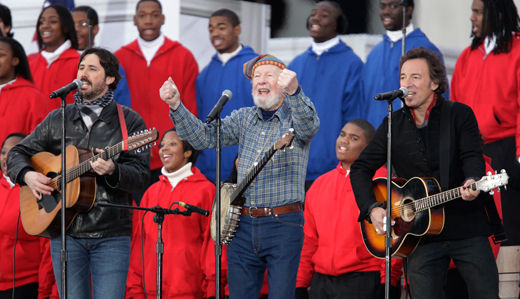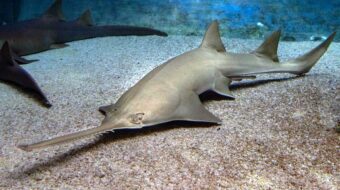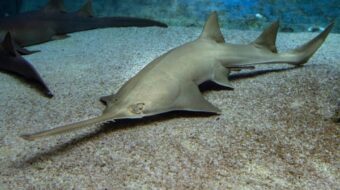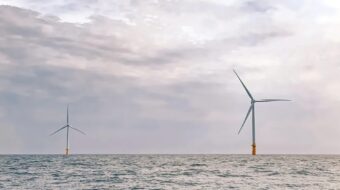
Part 3 of a 3-part interview
Playing the music
David Kupfer: What was it like playing up on the Lincoln Memorial on the Washington Mall for the Obama inauguration?
Pete Seeger: These big things; I tend to be against them, but Bruce Springsteen is such a nice guy; he is very honest and he says, “we have arranged everything and you don’t need to think about anything except singing one song,” and they let me sing the verses which had been cut out of the school song books.
In the squares of the city, In the shadow of a steeple;
By the Relief Office, I’d seen my people.
As they stood there hungry, I stood there wishing,
Is this land made was you and me.
There was a big high wall there that tried to stop me;
The sign was painted, it said ‘private property’;
But on the back side it didn’t say nothing;
That side was made for you and me.
Nobody living can ever stop me,
As I go walking that freedom highway;
Nobody living can ever make me turn back
This land was made for you and me.
DK: Why was singing these verses so important to you?
PS: These were the original verses, which Woody had written. He sang them several different ways. The way I learned it is how he wrote it, mentioning private property. He rhymed ‘stop me’ with ‘private property.’ Then the last verse I sang, he wrote afterwards, but he taught this to Arlo.
Arlo was about seven, and Woody had gotten out of the hospital on the weekend to visit his family. He said, “Arlo, they are singing my song, but they left out three of the best verses.” Woody sang those and taught Arlo; ‘nobody living can ever stop me.’ Down there in Washington I did not have to think about food or transportation or anything else, I just had to memorize those 6 verses.
DK: What impressed you about that event?
PS: What I recall is the freezing dress rehearsal the day before. It was January 17th at 7:30 at night. My hands were frozen and we sang that song three times through for every cameraman to know exactly where to aim the cameras and every microphone person to know where to take the microphone when and where. I was amazed at how well it was organized. The teenagers who sang had been rehearsing for one week so they could sing behind us.
DK: Do you have any method for plugging into your muse for the songwriting?
PS: No. Sometimes when you most want to write a song, you can’t think of a thing. On the other hand, I wrote that song; that funny little song about ‘if you can’t be reduced.’ I had a cold for 4 days and I could not speak to anybody; I had a bad sore throat and my feet were up in the air for 4 days and I put the words on the wall; I stuck them with a thumbtack to the wall; Three feet from the right of my head and by gosh, at the end of 4 days, I had a song and have sung it for a wide variety of audiences now.
Ideas
DK: Your father, when he was 90, said to you something that really stuck out in your mind about scientists and their view that….
PS: Scientists think that an infinite increase in empirical information is a good thing. Can they prove it? Of course they can’t. It is a religious belief. Something they feel must be true.
DK: How do you assess his statement now 50 years later?
PS: Right after that he turned to me with his wry smile and says, “of course, if I’m right Pete then perhaps the committee that told Galileo to shut up is correct.” All you can do is laugh. Hegel says there was always thesis; there was always anti-thesis and there is always synthesis and the synthesis in the song, “Turn, turn, turn.”
Now I talk with deeply religious people whenever I have a chance and say to them, when you come to a curve, do you look up into the sky and say, “God, it is dangerous crossing the streets; will you please see to it that I don’t get hit?” No! You look to the left; you look to the right and if there is no car coming, you cross. If we use the brains God gave us, there will still be a human race here after years.
DK: Prayers alone are not going to do it.
DK: I liked your idea to construct a swimming structure in the Hudson River.
PS: I met a woman in New York who had the same idea. She came up here and designed one and now we have one, what we call a river pool.
DK: You helped to catalyze that? And the river pool has been around for several years now?
PS: No, only actually one year. Last year it was in the river for two months, and worked out. About a thousand kids swam in it. It has netting underneath it and on the sides, keeping anyone from escaping and getting drowned, and it goes up and down with the tide. Our hope now is to build a big river pool so someone can swim 75-foot laps. It celebrates the fact that the river is now swimmable. It was not very swimmable 40 years ago.
DK: Have you been heartened by this new wave of environmentalism?
PS: Yes! And I heard just today that that Obama has appointed Van Jones to some job in Washington. [This interview took place in the spring of 2009 — ed.]
DK: Yes, as of last month. He is now working for Obama’s Council of Environmental Quality as an advisor for Green Jobs, Enterprise and Innovation. You have become a big fan of Van Jones and his Green Job’s campaign; do you think his notions are the best vehicle to get us towards a peacetime economy beyond war?
PS: Wonderful things. I mistrust the word THE. The answer; the solution. The Savior; the End. The beginning.
DK: Do you find him pretty inspiring?
PS: I recommend that book [The Green Collar Economy] to everybody, especially young people. I am hoping to get the chance to speak to the high school kids here and tell them, “you are always being asked questions by grownups. Why don’t you act better? Why don’t you do this and that? I think that teenagers should think about questions to ask grownups. Why is it that you do certain things? Why do grownups think they know all the answers? And many of them are deeply insecure and probably taking it out on you because you are helpless
Experiences
DK: You have had a long time love affair and relationship with the Hudson River. Can you tell me about your first encounter and what inspired your life long time commitment?
PS: I was learning how to sail. A teenager taught me how to sail when I had a job on Cape Cod at midnight. He took me out in a little ten-foot boat and showed me the aim is not how fast you go but that you sail at all. It is a game with the wind and the waves. And the wind can be coming; trying to blow me south, but if I use the sails right, I can go northwest. I can go northeast; northwest and the very power of the wind; I can sail right into it. And that is life too. Dr. King would zig and zag and land in jail but more contributions would come in.
DK: You use this as a metaphor for social movements but what of your boat ride?
PS: I was trying to learn to sail. We got a little plastic boat and went out and bought myself one and Toshi says, “you sure you are safe all by yourself?” I said I would stay out of the main current so I wouldn’t get hit. But I forgot to pull up the centerboard when I anchored to go to sleep for a while and I woke up because the centerboard had hit the bottom and it was just hooked on. I had to swim under the boat and lift the centerboard up and stick it in the slot again and hook it up.
But when I went to bed, the sun turned slowly from yellow to orange to red to purple to midnight black and I wrote a song:
(sings) Sailing down this golden river…sun and water all my own.”
DK: You are at a certain crest in your life.
PS: I am worth money.
DK: I think it is the spirit that you’ve embraced that people value more than the money. So many of the causes you have helped champion celebrate their successes in part because of the efforts of you and your colleagues.
PS: I look upon myself as a link in the chain. I learned from Woody Guthrie just like he learned from others. I have been a sower of seeds. I have written a lot of songs about that. I am sure a lot of teachers have seen themselves as sowers of seeds. Some seeds fall on stones and don’t sprout, but some seeds fall on fallow ground and multiply one hundred fold.
Photo: Pete Seeger, center, Bruce Springsteen, right, and Seeger’s grandson Tao Seeger, perform during the ” We Are One: Opening Inaugural Celebration at the Lincoln Memorial” in Washington, Jan. 18, 2009. Carolyn Kaster/AP
Pete Seeger on the power of songs, an interview
Pete Seeger on youth, careers, and social movements,

MOST POPULAR TODAY

Zionist organizations leading campaign to stop ceasefire resolutions in D.C. area

High Court essentially bans demonstrations, freedom of assembly in Deep South


Afghanistan’s socialist years: The promising future killed off by U.S. imperialism

Communist Karol Cariola elected president of Chile’s legislature






Comments